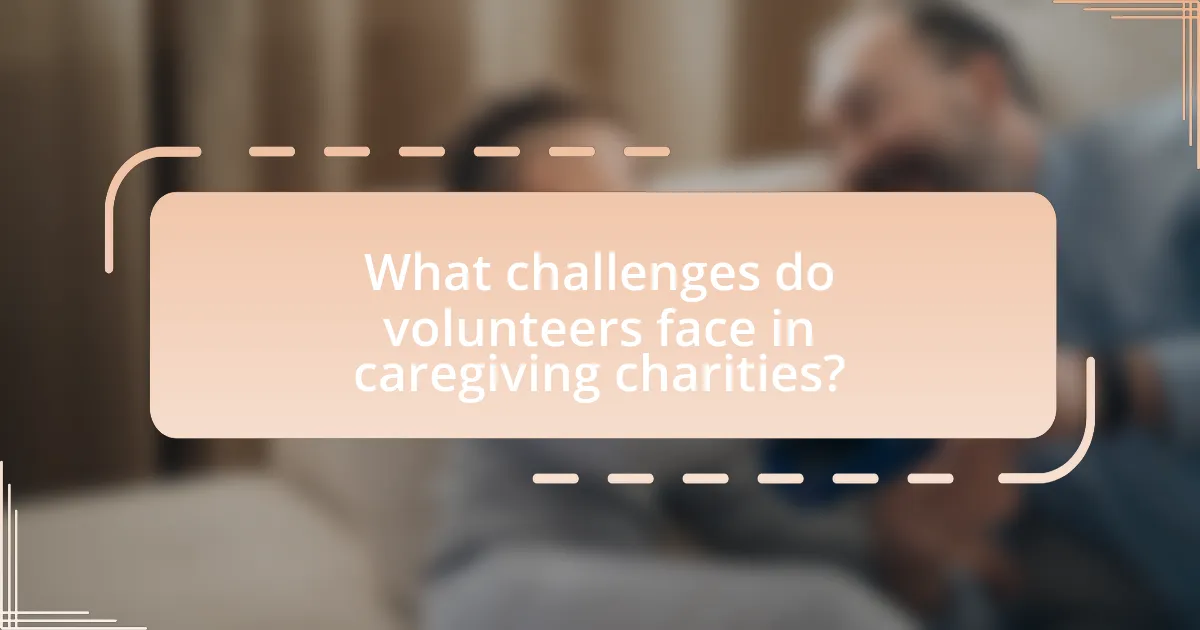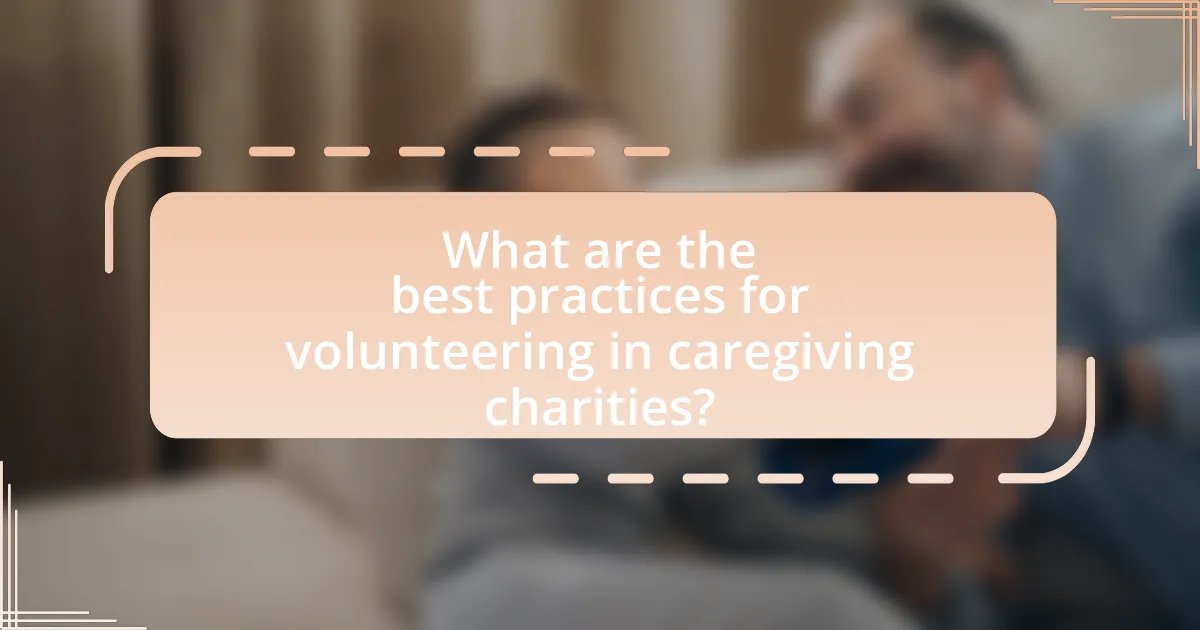Volunteer opportunities in caregiving charity encompass various roles, including direct patient care, administrative support, fundraising, and community outreach, aimed at assisting vulnerable populations such as the elderly and disabled. Individuals can engage by volunteering their time, donating resources, or raising awareness, with training programs available to enhance their skills. The article highlights the importance of volunteering in caregiving, detailing the benefits for both recipients and volunteers, the challenges faced, and strategies for effective involvement. It also discusses the broader societal impacts of caregiving volunteerism and provides resources for prospective volunteers to find opportunities in their communities.

What are Volunteer Opportunities in Caregiving Charity?
Volunteer opportunities in caregiving charity include roles such as direct patient care, administrative support, fundraising, and community outreach. These positions allow volunteers to assist individuals in need, often the elderly or disabled, by providing companionship, helping with daily activities, or offering emotional support. According to the National Volunteer Organizations Active in Disaster, volunteering in caregiving can significantly enhance the quality of life for recipients, demonstrating the tangible impact of such contributions.
How can individuals get involved in caregiving charities?
Individuals can get involved in caregiving charities by volunteering their time and skills to support various initiatives. Many caregiving charities seek volunteers for activities such as providing companionship to the elderly, assisting with meal preparation, or helping organize fundraising events. According to the National Volunteer Organizations Active in Disaster, over 63 million Americans volunteered in 2018, demonstrating a strong community interest in charitable work. Additionally, individuals can participate by donating resources, such as clothing or food, or by raising awareness through social media campaigns. Engaging with local caregiving charities often involves filling out a volunteer application and attending orientation sessions to understand the organization’s mission and needs.
What types of roles are available for volunteers in caregiving charities?
Volunteers in caregiving charities can take on various roles, including direct caregiving, administrative support, fundraising, event planning, and community outreach. Direct caregiving roles involve assisting individuals with daily activities, while administrative support includes tasks like data entry and managing communications. Fundraising roles focus on generating financial support through campaigns, and event planning involves organizing activities to raise awareness and funds. Community outreach roles aim to connect the charity with the local community, promoting services and recruiting more volunteers. These roles are essential for the effective operation of caregiving charities, as they help fulfill the mission of providing support and assistance to those in need.
What skills are beneficial for volunteering in caregiving charities?
Beneficial skills for volunteering in caregiving charities include empathy, communication, and basic medical knowledge. Empathy allows volunteers to connect with individuals in need, fostering trust and understanding. Effective communication skills are essential for conveying information clearly and compassionately, which is crucial in caregiving settings. Basic medical knowledge, such as first aid and understanding of common health issues, equips volunteers to provide appropriate support and assistance. These skills enhance the overall effectiveness of caregiving efforts and improve the quality of care provided to those in need.
Why is volunteering in caregiving charities important?
Volunteering in caregiving charities is important because it directly supports individuals and families in need of assistance, enhancing their quality of life. Caregiving charities often serve vulnerable populations, such as the elderly, disabled, or those facing health challenges, and volunteers provide essential services like companionship, transportation, and emotional support. Research indicates that volunteer involvement in caregiving can lead to improved mental health outcomes for both caregivers and recipients, as noted in a study published by the Corporation for National and Community Service, which found that volunteers report higher levels of happiness and lower levels of depression. Thus, volunteering not only benefits those receiving care but also fosters a sense of community and personal fulfillment among volunteers.
How does volunteering impact the lives of those receiving care?
Volunteering significantly enhances the lives of those receiving care by providing emotional support, companionship, and practical assistance. Research indicates that individuals who receive care from volunteers often experience improved mental health outcomes, including reduced feelings of loneliness and increased overall well-being. A study published in the Journal of Health Psychology found that patients receiving visits from volunteers reported higher levels of happiness and satisfaction with their care. Additionally, volunteers can help bridge gaps in care by offering services such as transportation, meal preparation, and social interaction, which are crucial for individuals who may be isolated or have limited mobility. This multifaceted support not only addresses immediate needs but also fosters a sense of community and belonging among those receiving care.
What are the broader societal benefits of volunteering in caregiving charities?
Volunteering in caregiving charities provides significant societal benefits, including enhanced community cohesion and improved mental health outcomes. When individuals engage in caregiving volunteer work, they foster social connections and build networks of support, which can lead to stronger, more resilient communities. Research indicates that communities with active volunteer participation experience lower crime rates and increased civic engagement, as noted in a study by the Corporation for National and Community Service. Additionally, volunteers often report improved mental health, as helping others can lead to increased feelings of purpose and reduced feelings of isolation, supported by findings from the Journal of Happiness Studies. These benefits collectively contribute to a more compassionate and interconnected society.

What challenges do volunteers face in caregiving charities?
Volunteers in caregiving charities face several challenges, including emotional strain, time commitment, and lack of training. Emotional strain arises from witnessing suffering and loss, which can lead to burnout; studies indicate that 40% of volunteers report feeling overwhelmed by the emotional demands of caregiving. Time commitment is another significant challenge, as many volunteers juggle their responsibilities with personal and professional obligations, making it difficult to maintain consistent involvement. Additionally, a lack of training can hinder volunteers’ effectiveness, as many may not have the necessary skills to handle specific caregiving tasks, leading to feelings of inadequacy and frustration. These challenges can impact volunteer retention and the overall effectiveness of caregiving charities.
How can volunteers overcome emotional challenges in caregiving?
Volunteers can overcome emotional challenges in caregiving by practicing self-care, seeking support, and setting boundaries. Self-care activities, such as regular exercise, mindfulness, and adequate rest, help maintain emotional resilience. Research indicates that caregivers who engage in self-care report lower levels of stress and burnout. Additionally, volunteers should seek support from peers or professional counselors, as sharing experiences can alleviate feelings of isolation and provide coping strategies. Setting clear boundaries regarding time and emotional investment is crucial; studies show that caregivers who establish limits experience less emotional fatigue. These strategies collectively empower volunteers to manage the emotional demands of caregiving effectively.
What support systems are available for volunteers in caregiving roles?
Support systems available for volunteers in caregiving roles include training programs, mentorship opportunities, emotional support groups, and access to resources such as informational materials and community networks. Training programs equip volunteers with essential skills and knowledge, while mentorship opportunities connect them with experienced caregivers for guidance. Emotional support groups provide a space for volunteers to share experiences and cope with challenges, fostering a sense of community. Additionally, resources like informational materials and community networks enhance volunteers’ effectiveness and well-being in their caregiving roles.
How can volunteers manage their time effectively while volunteering?
Volunteers can manage their time effectively while volunteering by setting clear goals and prioritizing tasks. Establishing specific objectives helps volunteers focus on what needs to be accomplished, while prioritizing tasks ensures that the most important activities are completed first. Research indicates that individuals who set specific goals are more likely to achieve them, as demonstrated in a study published in the Journal of Applied Psychology, which found that goal-setting significantly enhances performance. Additionally, creating a schedule that allocates dedicated time slots for volunteering activities can help volunteers stay organized and committed, reducing the likelihood of last-minute rushes or missed opportunities.
What training is available for volunteers in caregiving charities?
Volunteers in caregiving charities typically receive training that includes basic caregiving skills, communication techniques, and safety protocols. This training is designed to equip volunteers with the necessary knowledge to provide effective support to individuals in need. Many organizations offer orientation sessions, workshops, and online courses that cover topics such as first aid, mental health awareness, and specific care techniques tailored to the populations they serve. For example, the American Red Cross provides training programs that focus on CPR and first aid, which are essential skills for volunteers in caregiving roles.
What topics are typically covered in volunteer training programs?
Volunteer training programs typically cover topics such as the organization’s mission and values, roles and responsibilities of volunteers, effective communication skills, safety protocols, and specific skills related to the service area. These topics ensure that volunteers are well-prepared to contribute effectively and safely. For instance, understanding the organization’s mission helps volunteers align their efforts with the charity’s goals, while training in safety protocols minimizes risks during service activities.
How can training enhance the volunteer experience in caregiving?
Training enhances the volunteer experience in caregiving by equipping volunteers with essential skills and knowledge necessary for effective support. This preparation leads to increased confidence and competence in handling caregiving tasks, which directly improves the quality of care provided to recipients. Research indicates that well-trained volunteers report higher satisfaction levels and a greater sense of fulfillment in their roles, as they feel more capable of making a positive impact. For instance, a study published in the Journal of Volunteer Administration found that training programs significantly improved volunteers’ self-efficacy and commitment to their caregiving responsibilities.

What are the best practices for volunteering in caregiving charities?
The best practices for volunteering in caregiving charities include understanding the organization’s mission, committing to regular participation, and maintaining clear communication with staff and fellow volunteers. Understanding the mission ensures that volunteers align their efforts with the charity’s goals, which enhances the impact of their work. Regular participation fosters trust and builds relationships with those being served, which is crucial in caregiving environments. Clear communication helps to address any concerns and ensures that volunteers are informed about their roles and responsibilities. These practices are supported by studies indicating that consistent volunteer engagement leads to better outcomes for both volunteers and the communities they serve.
How can volunteers ensure they are making a meaningful impact?
Volunteers can ensure they are making a meaningful impact by aligning their skills and interests with the needs of the caregiving charity they support. This alignment allows volunteers to contribute effectively, as evidenced by studies showing that volunteers who engage in roles that match their expertise report higher satisfaction and effectiveness in their contributions. For instance, a report by the Corporation for National and Community Service indicates that volunteers who utilize their professional skills in service roles are more likely to create significant outcomes for the organizations they assist. Additionally, regular feedback from the charity can help volunteers adjust their efforts to better meet the community’s needs, further enhancing their impact.
What strategies can volunteers use to connect with those they are helping?
Volunteers can connect with those they are helping by actively listening and engaging in meaningful conversations. This approach fosters trust and understanding, allowing volunteers to better comprehend the needs and feelings of the individuals they assist. Research indicates that active listening enhances interpersonal relationships, as it demonstrates empathy and validation, which are crucial in caregiving contexts. Additionally, volunteers can participate in shared activities, such as games or crafts, which create opportunities for bonding and rapport-building. Studies show that shared experiences can significantly improve the emotional connection between volunteers and those they serve, leading to more effective support and care.
How can volunteers maintain their own well-being while helping others?
Volunteers can maintain their own well-being while helping others by setting clear boundaries and practicing self-care. Establishing limits on the time and emotional energy dedicated to volunteering prevents burnout, allowing volunteers to recharge and remain effective in their roles. Research indicates that volunteers who engage in regular self-care activities, such as exercise, mindfulness, and social support, report higher levels of satisfaction and lower stress levels (Cnaan & Cascio, 2013, “The Role of Volunteers in Social Services”). By prioritizing their own mental and physical health, volunteers can sustain their capacity to assist others effectively.
What resources are available for prospective volunteers in caregiving charities?
Prospective volunteers in caregiving charities can access various resources, including online platforms, local organizations, and training programs. Websites such as VolunteerMatch and Idealist provide listings of caregiving opportunities, allowing individuals to connect with charities in need of assistance. Local nonprofit organizations often host informational sessions and workshops to educate potential volunteers about their missions and the specific roles available. Additionally, many caregiving charities offer training programs to equip volunteers with the necessary skills and knowledge, ensuring they can provide effective support. These resources collectively facilitate the engagement of volunteers in meaningful caregiving roles.
Where can individuals find caregiving charity opportunities in their area?
Individuals can find caregiving charity opportunities in their area through local nonprofit organizations, community centers, and online platforms such as VolunteerMatch and Idealist. Local nonprofit organizations often have dedicated programs for caregiving and can provide specific information about volunteer needs. Community centers frequently host events or have bulletin boards with postings for caregiving opportunities. Online platforms like VolunteerMatch allow users to search for volunteer opportunities based on location and interests, making it easier to connect with local charities focused on caregiving.
What online platforms facilitate volunteering in caregiving charities?
Online platforms that facilitate volunteering in caregiving charities include VolunteerMatch, Idealist, and All for Good. These platforms connect individuals with various caregiving opportunities, allowing users to search for volunteer roles based on their interests and location. For instance, VolunteerMatch has facilitated over 15 million volunteer connections since its inception, demonstrating its effectiveness in linking volunteers with caregiving organizations. Idealist offers a comprehensive database of nonprofit organizations, including those focused on caregiving, while All for Good aggregates volunteer opportunities from multiple sources, making it easier for individuals to find suitable roles in caregiving charities.
What tips can enhance the volunteering experience in caregiving charities?
To enhance the volunteering experience in caregiving charities, volunteers should actively engage in training and skill development. Participating in training sessions equips volunteers with essential caregiving skills, improving their confidence and effectiveness in providing support. Research indicates that well-trained volunteers are more likely to have a positive impact on the individuals they assist, as they can better understand the needs and challenges faced by those in care. Additionally, building strong relationships with staff and fellow volunteers fosters a supportive community, which can lead to increased job satisfaction and a more fulfilling experience.